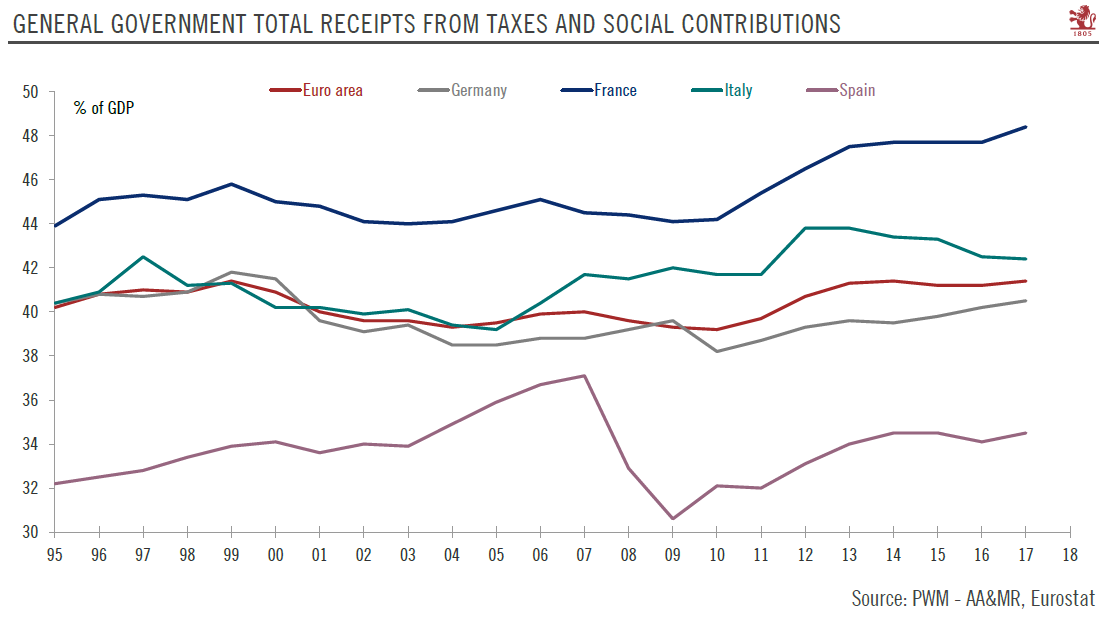Recent protests could have a negative impact on French growth, tax revenue and president Macron’s reform plans for his country and for Europe. French protests began on November 17 over hikes in fuel taxes, but have progressively broadened out into an expression of general anger with the French government about the cost of living and high taxes. To calm the situation, the government has dropped the planned fuel tax hike from next year’s budget. Whether or not this will be enough to satisfy the so-called ‘yellow vest’ protesters is unclear at this stage. The protestors’ ambitions now go far beyond fuel taxes to include demands for higher pensions, the repeal of other taxes and the restoration of the wealth tax
Topics:
Nadia Gharbi considers the following as important: 2) Swiss and European Macro, euro area economic activity, Featured, France, French economy, Macroview, newsletter, Pictet Macro Analysis
This could be interesting, too:
Nachrichten Ticker - www.finanzen.ch writes Die Performance der Kryptowährungen in KW 9: Das hat sich bei Bitcoin, Ether & Co. getan
Nachrichten Ticker - www.finanzen.ch writes Wer verbirgt sich hinter der Ethereum-Technologie?
Martin Hartmann writes Eine Analyse nach den Lehren von Milton Friedman
Marc Chandler writes March 2025 Monthly
Recent protests could have a negative impact on French growth, tax revenue and president Macron’s reform plans for his country and for Europe.
French protests began on November 17 over hikes in fuel taxes, but have progressively broadened out into an expression of general anger with the French government about the cost of living and high taxes.
To calm the situation, the government has dropped the planned fuel tax hike from next year’s budget.
Whether or not this will be enough to satisfy the so-called ‘yellow vest’ protesters is unclear at this stage. The protestors’ ambitions now go far beyond fuel taxes to include demands for higher pensions, the repeal of other taxes and the restoration of the wealth tax abolished just last year.
Emmanuel Macron was elected French president in 2017 on a platform of economic reform; however, the recent protests, and his government’s response, could well change the course of Macron’s presidency, with the wide popular support for the yellow vests increasing the pressure on him to rethink his economic programme.
| Our central scenario was for annual GDP growth of the order of 1.6% both this year and next in France. But the recent protests place these forecasts at risk of downward revision. Given the size of the French economy, this could also influence prospects for the euro area economy at large. The recent protests also show the dilemma of trying to maintain fiscal rectitude, as President Macron has promised, and launching unpopular structural reforms at the same time. This dilemma becomes more acute when growth turns down, (as seems to be the case in France). France is already skating close to the EU limit in terms of deficit spending. It is estimated the public deficit will be 2.6% in 2018 and the government has targeted a deficit of 2.8% for 2019.
With France already at risk of “significant deviation” from the required improvement in its deficit according to the European Commission, the pressure is likely to rise on the administration to find other ways to fill the budgetary hole left by dropping the fuel tax hike. The suspension of the planned fuel tax hike is likely to cost EUR4bn (~0.2% of GDP) in lost revenues. Ahead of the European Parliament elections next May, Macron can hardly afford to allow popular frustration rise further given the risk of boosting anti-establishment parties. Macron’s weakened domestic position also challenges his push for European reforms. All in all, how long the yellow vest protests last and how the government responds to increasing disillusion in French society in general will be key variables for our French economic outlook. |
General Government Total Receipts from Taxes and Social Contributions 1995-2018 |
Tags: euro area economic activity,Featured,France,French economy,Macroview,newsletter

